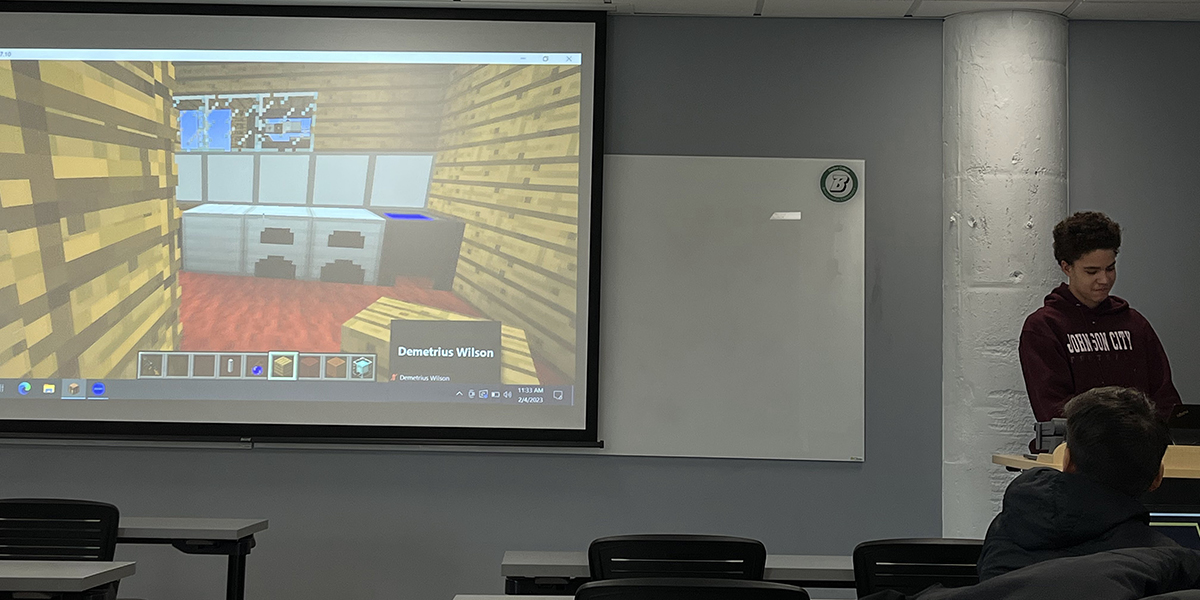Smart play: Middle-schoolers use Minecraft to learn engineering ideas
Associate Professor of Electrical and Computer Engineering Ning Zhou guides STEP workshops as students design digital ‘homes’

When you’re in videogame survival mode, what could be more useful than a smart house? Impenetrable by zombies, a password-protected, self-sustainable home would offer years of protection.
Students in Binghamton University’s Science and Technology Entry Program (STEP) have been learning how to build their own smart houses in Minecraft, a popular videogame, under the instruction of Associate Professor of Electrical and Computer Engineering Ning Zhou. STEP provides outreach, education and resources to middle and high school students who are economically disadvantaged or from historically underrepresented minority populations to increase their readiness for post-secondary education in STEM fields or licensed professions.
Working with the National Science Foundation in support of this program, Zhou thought his recent work with power grids could be effectively incorporated into the programming of Minecraft and would get students excited about potentially pursuing a career in a related field.
“We spotted the needs of the people in our neighborhood and identified STEM as a good starting point,” said Zhou, a faculty member in the Thomas J. Watson College of Engineering and Applied Science. “Even though a lot of students use electricity every day, they are not aware of where it comes from and how it works, and so they aren’t as aware of job opportunities in this area.”
Minecraft was chosen as an educational tool because of its fun and interactive game model. In the STEP program, students can build and design their own homes, and with the incorporation of Zhou’s lectures, they learn how to integrate complex power systems into their design and finish with a fully sustainable smart house.
For the past six weeks, Zhou has hosted class sessions on Saturday mornings with five local youths at the University’s Health Sciences Building in Johnson City, home to Decker College of Nursing and Health Sciences.
Zhou begins each session with a lecture that focuses on different electrical engineering basics, their application and how they can be included in the students’ smart house design. Following his mini lectures, the students have time to make additions to their smart houses based on the session’s learning objective.
“We give the students a basic layout so they know where to start,” Zhou said. “Minecraft serves as an example of what they’d be doing in the real world, and so our program helps students become more familiar with electrical engineering in a fun and engaging way.”
Each student is given a laptop at the beginning of the program that has Minecraft already installed, and they are allowed to take the laptops home during the week to work on their houses. At the end of the program, Zhou and his graduate research assistant, Tawsif Ahmad, host a competition for the students where they present their finished smart houses.
The contestants are evaluated using a rubric Zhou designed that takes their presentation, the structural design of their smart houses, their inclusion of power-grid technology and the implementation of an encrypted password protection system into consideration.
“The students learn how to write a simple code that lets them protect their smart houses with a password,” Zhou said.
“By the time of competition, they’re experts,” Ahmad added.
At this year’s competition, Daniel, a seventh-grade student from Johnson City, took home the winning prize. His smart house had a functioning solar power system, a complex circuit grid and a working password-protected door. The first-place prize, a solar-powered robotic car, was also received with great enthusiasm.
“Hopefully, their comfort with these systems will inspire a further interest in engineering,” Zhou said.
JR Beckford, STEP program assistant, is excited about what the project means for historically underrepresented and economically disadvantaged middle and high school students.
“It’s important that these students are given an opportunity to see a world bigger than their hometown,” he said. “It’s all about broadening their perspectives.”
Decker College Associate Dean for Diversity, Equity and Inclusion Sharon Bryant, who serves as the STEP program director, emphasizes the crucial role the program plays in promoting community “sweat equity.” Program directors are hopeful that following their graduation from post-secondary institutions, students will return to the Binghamton area and help further local STEM education.
“We’re focused on increasing the number of underrepresented students in the licensed STEM professions,” Bryant said.
So far, the STEP program has been successful in completing its mission. “We’ve seen a lot of positive outcomes from the opportunities we’re able to give to our students,” Bryant said. “One of our STEP graduates is finishing her master’s degree in environmental biology at the University of Delaware, and another graduate is completing her doctorate in chemistry at Syracuse University.”
Zhou hopes to see the same in this year’s group of students. “When I wrote the proposal for this collaboration, I wanted to bring opportunity to these students in areas of study that they may be unfamiliar with. Maybe in the future, they’ll choose this as a career path.”

